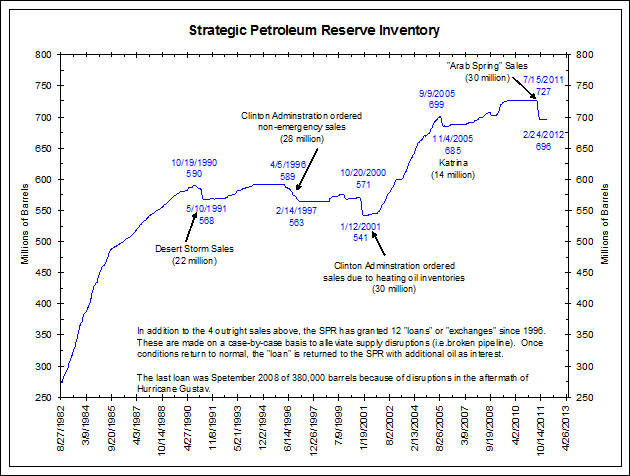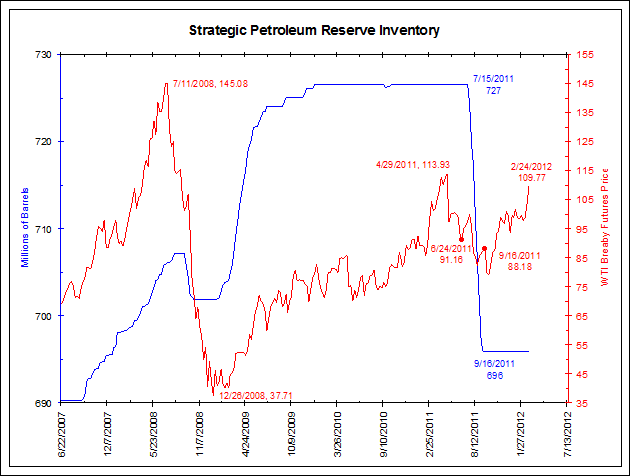<Click on chart for larger image>
- The Financial Times – Obama pressed to open emergency oil stocks
The Obama administration is coming under growing pressure to cool petrol prices by releasing emergency stocks of oil. However, critics say this would be the wrong response to the wrong problem at the wrong time. The oil price surge has increased speculation that the US and its allies could repeat the co-ordinated release of crude stockpiles they undertook last summer to compensate for lost supply from Libya. The move led to an 8 per cent price fall. On Friday, Timothy Geithner, US Treasury secretary, said there was “a case” for releasing crude from the US strategic petroleum reserve, or SPR, “in some circumstances” – a significant shift for an administration that had previously ruled out another release. What has triggered the change is the steady drumbeat of soaring petrol prices, with the US national average now $3.68 a gallon – a record February high. “Nothing terrifies a sitting president more than rising gasoline prices, which in President Obama’s case could imperil the economic recovery and torpedo his re-election prospects,” said Robert McNally, head of the Rapidan Group energy consultancy and a former White House official.
Comment
<Click on chart for larger image>
- The Telegraph (UK) – Soaring oil prices will dwarf the Greek drama
Since last week’s eurozone “grand summit”, the headlines have been positive and, in the official photos anyway, the main players appear to be smiling. As such, the global equity rally goes on
Behind the rictus grins, though, the gloves remain off, the rhetorical daggers still drawn. Having launched the biggest sovereign debt restructuring in history, Athens now faces the Herculean task of persuading holders of Greek bonds to accept a “voluntary” hair-cut. Creditors are being asked to swap their bonds for a combination of new short-term instruments, issued by the European Financial Stability Facility, and longer-term Greek government debt. If half of them agree to take the hit then, under “collective action clauses” approved by the Greek parliament, the deal could be forced on all bond-holders. This is a default in all but name, then, with “the powers that be” desperate to hold the single currency together while not triggering credit default swap (CDS) insurance policies that could themselves spark a whole new wave of financial panic. The reported bond-holder loss will be 53.5pc – a headline number largely for the consumption of furious taxpayers in those eurozone nations that remain notionally solvent. In reality, payment durations and coupons will be tweaked, once the media has moved on, to ensure bondholders suffer less. To be sure, though, there is still significant loss embedded in this deal, which is why the CDS switch could ultimately be flicked. That remains the case even if tame ratings agencies confirm their ludicrous “judgement” that an imposed €200bn (£170bn) debt-swap doesn’t amount to a “credit event”.


The chart above shows the SPR’s inventory level, highlighting the last four SPR sales.
Regarding the highlighted part above about last year’s release, see the chart below. The last announcement of an SPR release occurred on June 24, 2011 encompassing a release of 60 million barrels globally, 30 million of which came from the U.S. SPR.
Overlaid on the SPR inventory levels is the price of nearby WTI futures. WTI closed at $91.16 the day of the announcement. It rose to $97.60 the week the release began (July 15, 2011) and dropped to $88.18 the week the release ended (September 16). This is a drop of 3% from the announcement to the end of the release. It is a drop of 8% to 10% during the release.
The U.S. consumes 19 million barrels of crude oil a day, so a 30 million barrel release is roughly 50 hours of consumption spread out over 30 days. The world consumes 80 million barrels of crude oil a day, so a 60 million worldwide release is 18 hours of consumption spread out over 30 days. We will leave it the reader to decide if the SPR release made a difference.
When gas prices rise, politicians are helpless to do anything over the short-term. This is especially troublesome for politicians when an election is less than a year away. SPR releases are ineffective at altering the price. They do, however, give politicians cover to take credit for any down-tick or argue any up-tick would have been worse without the release.
Therefore, we expect an announcement of SPR release in the next several weeks. We expect it to be met with plenty of fanfare and arguments that it will matter. We expect it will again amount to hours of consumption and not make a difference. Administration officials will disagree.